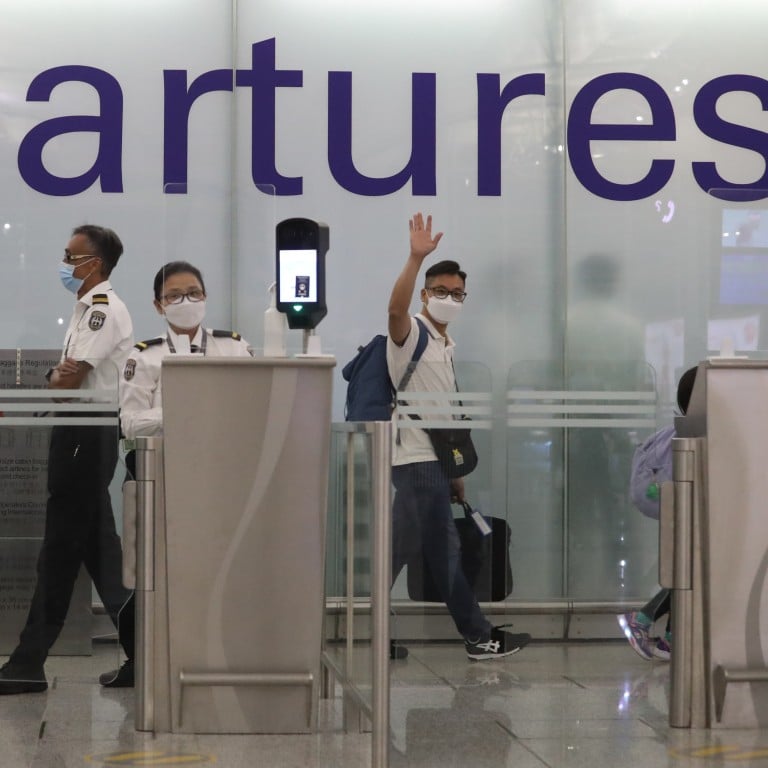
A smart way for newly arrived Hongkongers to pay the UK’s global tax
- Hongkongers looking to start afresh in the UK following the sale of their property have to contend with a complex tax system
- The taxes include a capital-gains tax of up to 28 per cent on property and as much as 18 per cent on other assets
Two years into the Covid-19 pandemic, Hong Kong International Airport – once one of the world’s busiest – is a former shadow of itself. These days, it mostly shows Hongkongers and long-term residents bidding a tearful farewell to the city they have always called home.
Those who have left have established a new life abroad, going about their daily business in their new place of residence. And with reality soon kicking in, they find life challenges are no different anywhere else.
Newly-arrived Hongkongers in Britain, for instance, will quickly face a brutal, complex tax system, especially for those seeking to sell an old flat to fund a new life.
This includes a capital-gains tax of 18 to 28 per cent on property, 10 to 18 per cent on other assets and 8.75 to 39.35 per cent on dividend income above £2,000 (US$2,510), to name a few.
The good news is that the UK grants a grace period for fresh immigrants. If you sell your Hong Kong property within nine months of arrival, the profit is exempted from capital gains tax.
Another major benefit is the “private residence relief”, which helps cut the tax on gains made if one is unable to sell the main residence before the nine-month deadline.
That said, not everything happens as one wishes.
It took Edwin two years after arriving in the UK to finally sell his Hong Kong flat, bought 10 years before he left the city, for a profit of HK$10 million (US$1.27 million). As a result he found himself at the top end of the capital gains tax of 28 per cent.
He ought to pay tax for the period of ownership (12 years) minus pro-rata occupancy as main residence (10 years plus nine months).
Had the flat been an investment instead of a self-occupied residency, the capital gains tax would have been calculated in full, i.e. HK$2.73 million.
Taking into account tax exemption, private residence relief and everything, the tax payable would be considerably lower at HK$284,378 – still a bleeding expense to Edwin the newcomer.
Fortunately, there are ways to alleviate the pain.
A new arrival could declare one’s main domicile still to be Hong Kong by showing intention of future return – such as to keep a local address and maintain contact – to get tax exemption on their Hong Kong property gains, a flexibility under the UK’s global tax system where it charges citizens’ worldwide income.
Such a declaration will not affect your British Nationals (Overseas) “5+1” emigration scheme since the UK allows dual nationality. The British tax authority nonetheless reserves the right to dispute.
After declaring a main domicile outside the UK, one could choose to be taxed on “remittance basis” instead of “arising basis”. Choosing the former dictates your taxable foreign income must stay outside the country. Otherwise, it may count as a part of your British income and will be subjected to an income tax as high as 45 per cent – which could more than erase your total gains.
Keeping cash after the sale of your property to avoid further tax may bring you temporary peace of mind, but you may bear opportunity cost, especially factoring in inflation in the foreseeable future.
Some may consider investing the sales proceeds into non-dividend funds or ones that automatically reinvest the payout, so as to minimise the taxable income. Although this profit, when transmitted into the country, is still under non-residential property capital gains tax of as much as 18 per cent, it’s still a happy alternative to the almost 40 per cent dividend tax.
There’s no free lunch though. To use remittance basis taxation means you lose the British tax exemption benefit, for instance a £12,700 individual income tax allowance for a UK employee.
At some point in the future when one decides to transfer the foreign income into the UK, one should elect to notify the tax authority and request to be taxed instead on arising basis.
For instance, for gains from selling a Hong Kong flat held for investment, the UK charges capital gains tax, plus income tax incurred from tenancy. Paying tax of as much as 28 per cent is hard, but still a better option than remitting the full fund and churning out the maximum 45 per cent income tax.
Moreover, the remittance basis method comes with a ticking clock. Living in the UK over 15 years automatically makes Britain one’s main domicile. All income is then charged on a global tax arising basis.
There is no remittance-basis tax for the first seven years in the UK. It then costs £30,000 from the eighth to 12th year, rising to £60,000 from 13th to 15th year. This path only makes sense to people who could potentially save more than that amount.
All in all, remittance basis taxation works best for people whose overseas income exceeds domestic British income, and don’t plan to get the foreign gains into the country. Otherwise, the profit abroad will still be taxed with a higher rate via arising basis once crossing the border, rendering the previous effort rather futile.
Raymond Chong is chief executive officer and founder of mortgage referral brokerage firm StarPro Agency




